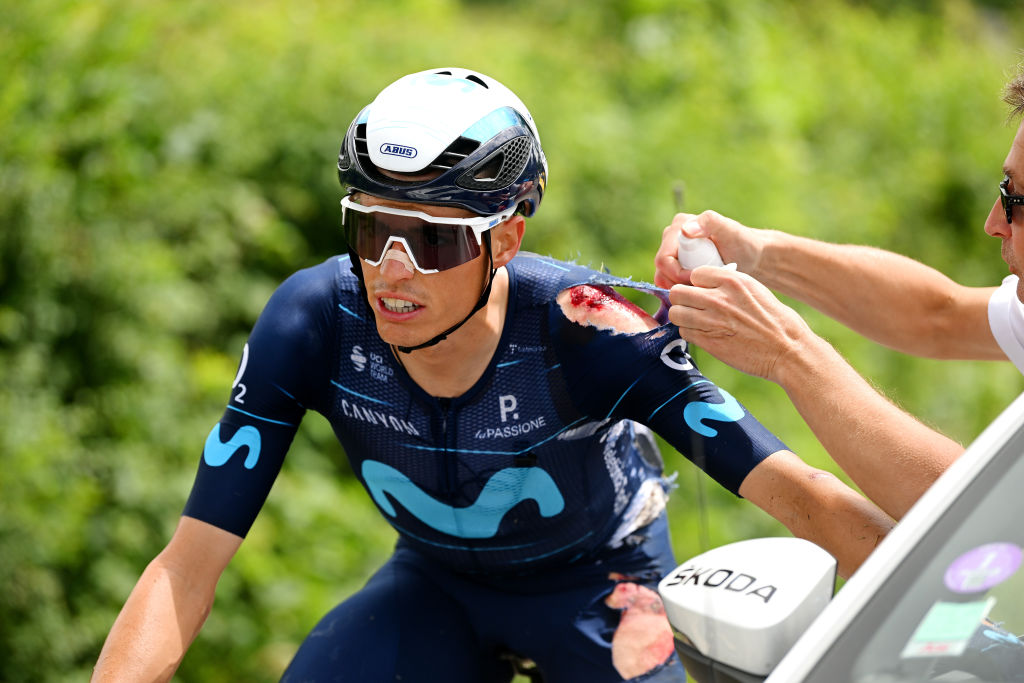‘This is the most conservative sport’ – Movistar manager calls for substitutions in Grand Tours
Eusebio Unzué indicates his team is involved in initial One Cycling talks

When Eusebio Unzué sat down with reporters in the lobby of the Hotel Estelar in Paipa on the eve of the Tour Colombia, conversation naturally turned to his first visit to these parts in the autumn of 1995.
At that year’s World Championships, Unzué was in the team car behind Miguel Induráin when he claimed time trial gold in Tunja, and he was on hand four days later when Miguelón helped Abraham Olano to Spain’s first road race title. The Colombian exhibition ended with a failed attempt at the Hour Record in Bogotá, but it did little to sour the memories.
“Miguel punched the air when he crossed the line in second place, and I think that gesture summed up the teamwork of that period,” Unzué recalled.
The Movistar manager isn’t in Colombia purely out of nostalgia, of course. This week marks the formal beginning of Nairo Quintana’s second spell in Movistar’s colours.
$270 million from Saudi Arabian investor could drive One Cycling reform project
Plugge lifts lid on ONE Cycling goals, pushes for F1-style race calendar
WorldTour 2.0 - Expect One Cycling project to make small, covert steps in 2024
Patrick Lefevere and Soudal-QuickStep committed to One Cycling reforms project
“In his first nine years with this team, we helped him, but he also helped us,” Unzué said of the Colombian, who spent a year on the sidelines following his positive tests for Tramadol on the 2022 Tour de France before Movistar surprisingly offered him a way back in last autumn.
Yet while that attempt at repeating the past has drawn all the headlines in the build-up to the Tour Colombia, Unzué also had thoughts about the future of the sport, namely the One Cycling project championed by Visma-Lease A Bike manager Richard Plugge and a select group of teams, who view it as a chance to wrest some control of revenue from race organisers and reshape the balance of power in the sport.
Last week, Reuters reported that an investment firm owned by Saudi Arabia’s Public Investment Fund (PIF) is in talks to provide €250 million of backing to the venture. Saudi Arabia has invested heavily in international sport in recent years amid criticism that it is doing so to distract from its human rights record.
Get The Leadout Newsletter
The latest race content, interviews, features, reviews and expert buying guides, direct to your inbox!
“There are concerns from teams who are understandably thinking about the future of this sport,” Unzué said of the One Cycling project.
“They want to discover other pathways to make us a bit more competitive in this jungle of sport. But we can’t give out any details given the phase it’s in at the moment. I think it’s important that we have this in mind, and we’ll see the reactions of the people who could be interested in this.”
Movistar have not previously been reported as being among the parties active in discussions over the One Cycling project, but Unzué indicated on Monday that his team is “part of the group which is going to have other meetings soon.”
The precise structure of the putative league remains a mystery, and Reuters reports that neither Tour organiser ASO nor Giro d’Italia organiser RCS Sport are currently part of discussions over what Visma-Lease A Bike has claimed could be “a more sustainable business model” for cycling.
“I think this is the most conservative sport,” Unzué said, looking at the wider picture and the lack of evolution in professional cycling.
“I think almost all sports develop, whereas we’re still doing the same things we’ve always been doing. Since I started in the 1980s, the rules of cycling have changed very little, and I think you need to adapt to the current time. You have to make the regulations and rules more… well, I’m not sure if it’s right to say ‘more human,’ but certainly they should be less brutal.”
With Enric Mas’ crash on the opening day of the 2023 Tour still fresh in his mind, Unzué floated the idea that any reforms of cycling could extend to allowing substitutions in Grand Tours in the event of injury.
“If a rider crashes, can he not climb into a car or ambulance to get examined and then start again the next day if he hasn’t broken anything. Why not?” Unzué said. “We want more humanity. We want to protect the riders’ health.
“And why don’t we allow substitutions, at least in the first week of a Grand Tour? We lost Enric on the first day to a crash. So why not at least allow us to replace him and have eight riders on the team?
“I think we’ve all grown used to the idea of an epic sport and the belief that all these things form part of the epic nature of the sport. But remember, football didn’t allow substitutions in the past either.”
Asked about the prospect of the Grand Tours being reduced in length as part of any reforms, Unzué said it was “a question of personal opinions,” adding: “If they were reduced to 15 days, the best riders would probably ride all three Grand Tours. That would give them enough time to recover between them and be competitive in all three. It would create spectacle if the best riders were racing against each other more often.”

Barry Ryan was Head of Features at Cyclingnews. He has covered professional cycling since 2010, reporting from the Tour de France, Giro d’Italia and events from Argentina to Japan. His writing has appeared in The Independent, Procycling and Cycling Plus. He is the author of The Ascent: Sean Kelly, Stephen Roche and the Rise of Irish Cycling’s Golden Generation, published by Gill Books.